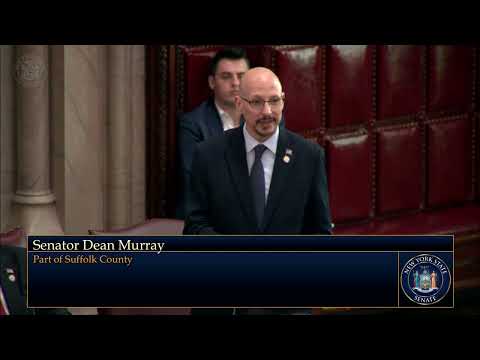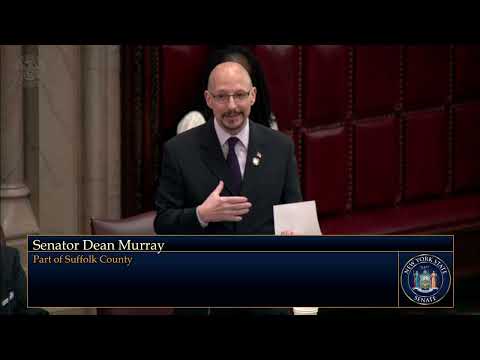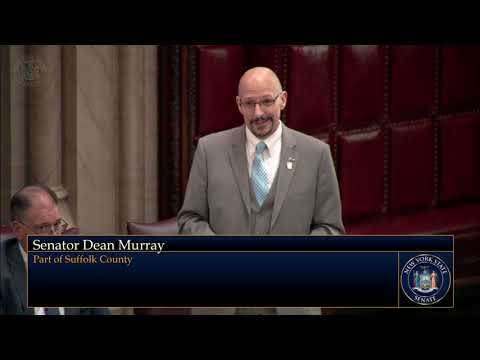
NYS Senator Dean Murray Says It’s Time for The State to Take Control of the MTA’s Finances
December 11, 2024

(Hauppauge, NY) – Today, New York State Senator Dean Murray announced plans to introduce legislation in the upcoming 2025 legislative session that will create a Financial Control Board to take over and stabilize the Metropolitan Transportation Authority’s (MTA) finances. Joined by colleagues in the NYS Senate and NYS Assembly, as well as Suffolk County Executive Ed Romaine, Suffolk County Comptroller John Kennedy and several Union Leaders, Senator Murray emphasized the need for increased oversight and accountability at the MTA to address longstanding issues of mismanagement, fraud, waste, and safety concerns that have cost taxpayers hundreds of millions of dollars annually.
NYS Senator Dean Murray, 3rd Senate District, says, “Year after year we see the MTA come to the state, hat in hand, claiming that if we don’t find more money for them, we will face a transportation nightmare… All the while, that same MTA is losing hundreds of millions of dollars a year through waste, fraud and mismanagement. Enough is enough!” Murray added, “It’s time we had some real oversight and accountability to clean up the MTA’s fiscal mess in a way that will protect taxpayers from unfair and unaffordable funding schemes like congestion pricing. It’s time to ensure the MTA becomes the reliable, efficient transit system that New Yorkers deserve”.
"The MTA continues to frustrate hardworking New Yorkers who rely on it daily. Mismanagement, out-of-control costs, and a lack of transparency have eroded public trust, and vague promises of change aren’t cutting it. That’s why I, along with my
colleagues, am once again calling for a full, independent audit of the MTA. We need to identify inefficiencies and bring transparency to an agency funded with taxpayer dollars. New Yorkers deserve a transit system that is reliable, cost-effective, and accountable—not one weighed down by bureaucracy and poor management, all while being bailed out with a new tax on commuters. An independent audit is a step in making that a reality,” said Senator Patricia Canzoneri-Fitzpatrick (Senate District 9).
"The MTA is failing to meet its obligations to Long Island residents and commuters. The Authority has shown that despite continual increases in their budgets, fare and toll hikes and new taxes, like congestion pricing, they are unable to meet the region's growing needs let alone adequately maintain our aging infrastructure. Pouring additional tax dollars into the MTA is not a solution. We need greater oversight to ensure the state's massive investments in the MTA are directed at building a world-class transportation system--not propping up a failing government authority rife with fiscal mismanagement and waste," said Senator Anthony Palumbo (Senate District 1).
“The MTA faces a dire fiscal crisis, with inefficiencies and mismanagement costing taxpayers millions annually. Establishing an MTA Fiscal Control Board will ensure oversight, balanced budgets, and reforms to protect taxpayers and riders from unfair financial burdens. This legislation is critical to restoring accountability and securing the future of our transit system,” said Senator Alexis Weik (Senate District 8).
“The management of the MTA is a perennial issue, and it needs to be reigned in. A Control Board with some teeth to fix the wage theft, overtime, and mismanagement is the answer at this time, instead of pouring billions of more taxpayers’ dollars into it. Rather than taxing New Yorkers more with a Congestion Price, how about making the MTA get its fiscal house in order. I applaud Senator Murray’s leadership on this issue, especially his focus on the mismanagement and honoring and leaving the current union contracts in place. The OSC and Tom DiNapoli point out the fiscal problems, we need a Control Board to perform emergency cancer surgery and remove the tumors from the MTA and a path to fiscal recovery once and for all! Enough already! Long Island is tired of being an ATM for New York City and the MTA,” said Assemblyman Keith Brown (Assembly District 12).
“Year on year we see unbridled increases in both MTA fares, and MTA related taxation. While a critical backbone of New York's infrastructure, the MTA must exist within a fiscally sound environment, rather than one of limitless spending and limited responsibility. This legislation will restore taxpayers' confidence while providing fiscal control over an agency that spends billions transporting millions, and give New Yorkers the world-class transit system they deserve,” said Assemblywoman Jodi Giglio (Assembly District 2).
“I applaud Senator Murray’s efforts to bring attention to the MTA’s finances. Taxpayers deserve to know how their dollars are being spent by an agency that is in charge of critical infrastructure,” said Suffolk County Executive Ed Romaine.
“Responsible fiscal control is long overdue for this organization. Their track is abysmal and only with firm fiscal oversight will public confidence be restored to the financial operations of the MTA,” said Suffolk County Comptroller John Kennedy.
“As a principal office of IBEW local union 589 and an employee of the LIRR for close to thirty years, I agree with Senator Dean Murray, in bringing forward this legislative proposal for a finance control board. For too long, the MTA, specifically the LIRR, has demonstrated its inability to manage its fiscal obligations, resulting in excessive costs to the riding public and state ratepayers. Instead of blaming labor for its mismanagement, we welcome an independent set of eyes to hold all parties accountable. Labor can be part of the solution when it has a willing partner,” said Ricardo Sanchez, General Chairman IBEW, International Brotherhood of Electrical Workers, IBEW 589.
“As an elected officer in BRS Local 56 since 2011 and an employee of the LIRR since 2001, I agree with Senator Dean Murray, in bringing forward this legislative proposal for a finance control board. Whether the message comes from the Office of the New York State Comptroller or by way of legislation, the MTA has been reticent to manage its fiscal obligations, resulting in excessive costs to the riding public and state taxpayers. Instead of blaming labor for its mismanagement, we welcome an independent set of eyes to hold all parties accountable. We are on the record as stating that we will not push back against reasonable guard rails. Labor can be part of the solution when it has a willing partner who will listen to the subject matter experts—the front-line workforce,” said Michael Sullivan, LIRR BRS General Chairman.
The legislation proposes an amendment to the Public Authorities Law, adding a new section to establish a five-member financial control board for the MTA. The board will include appointees recommended by the majority and minority leaders of the State Senate and Assembly, with all members appointed by the Governor, who will also designate a chairperson. Key provisions include:
· Unanimous Board Decisions: The board will act only by unanimous vote to ensure decisions reflect a broad consensus.
· Project Oversight: The board will have the authority to review and approve financing and construction projects proposed by the MTA. Prior approval will be required before the MTA can enter into agreements or incur debt.
· Comptroller Involvement: The board may request information from the State Comptroller to assess the financial feasibility of proposals.
· Contract Compliance: The board will honor all existing contracts, including labor agreements, and will not have authority to alter them, but will participate in negotiations of new contracts.
· Accountability Measures: The Governor will have the authority to remove any board member found to be acting beyond his or her legal scope.
The proposed financial control board is modeled after similar state oversight mechanisms that have been implemented for city governments, counties, and school districts facing significant fiscal challenges. Senator Murray and his colleagues believe that when systemic financial problems arise, state leaders have a responsibility to step in and stabilize the affected entity.
The legislation is aimed at ensuring the long-term fiscal stability of the MTA while preserving and enhancing the vital services it provides to millions of New Yorkers.
Share this Article or Press Release
Newsroom
Go to Newsroom


